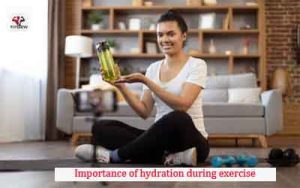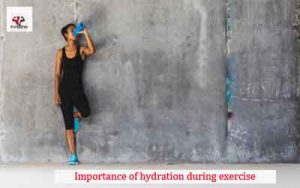Staying hydrated while you engage in any activity is very essential, but more important here is for you to stay hydrated during exercise.
This content is about the importance of hydration during exercise. Read till the last dot to get all the information the necessary information available about hydration here so you can always ensure to stay hydrated while engaging in your exercise routines.

Importance of hydration during exercise
Overview of the Importance of Hydration during Exercise
When you take fluids, it keeps your body hydrated and your body needs them to function at its best.
If you don’t drink enough fluid it can result in any of the following:
- Your body temperature and heart rate may rise. Your body won’t regulate heat properly if the total amount of water in your body is below the normal level (hypohydration).
- You may feel tired than you use to.
- It can result to your inability to clearly think. Your motor control, decision-making abilities, as well as concentration may be impaired.
- Your body’s functions like gastric emptying may slow down will can result to your feeling uncomfortable in your stomach.
- Your performance in sport may not be as good as it ought to be. The impact becomes worst when you are active and also dehydrated in hot conditions.
To avoid all of these issues, when you are exercising drink enough fluids and ensure to make replacement of fluid a priority when you are physically active.
Drinking the right quantity of fluid will assist in the maintenance of your concentration as well as performance, enhance your endurance, and also avoid excessive elevations in heart rate and body temperature.
What is hydration all about
The quantity of water your body requires is dependent on a variety of factors like climatic conditions, your health, your clothing, the intensity of your exercise as well as the duration. That is to say that being well hydrated is different in persons and situations.
As a guide, you probably need more fluid if:
- You sweat heavily
- You have some medical conditions like diabetes or heart disease
- You have cystic fibrosis, which means having a high concentration of sodium in your sweat
- You are making use of a medication that can act as a diuretic, which makes your body to lose more fluid.
- You have a bigger body size
- You are fit (fitter people tend to sweat more and earlier in their exercise)
- You are engaging in vigorous exercise.
- You are active in hot or humid conditions.
That you are thirsty is not the best way to indicate you need to drink water. When you feel thirsty it means you are already dehydrated.
A good test of dehydration is the colour of your urine. When the colour of the urine is pale and clear it means you are well hydrated. When it is darker it means you need to drink more fluid.
Lack of sweating during vigorous activities is another sign to show you are dehydrated and it can also show that you are suffering from heat exhaustion.
The fluids to take when you are exercising
Water is the best fluid you can take to replenish the fluid lost while exercising. You can as well drink water before exercising.
There are so many benefits gotten from taking water. And aside the benefits, water is natural, free, readily available. Also, water does not contain kilojoules and contains fluoride which is good for your teeth.
Some athletes take sports drinks that contain electrolytes and carbohydrates, and they have concentrations that helps the body to refuel during exercise. Sports drinks may be useful if your activity is moderate to vigorous in intensity for more than 60 minutes. Since sports drinks can contain so much sugar, it is then necessary you take it only when required.
Also, fruits and vegetables contain a high proportion of water, so a fruit snack like oranges can assist in the replacement of fluid.
The fluids you should not take when exercising
Here are some fluids that are not recommended for you to take when exercising.
- Avoid cordial, soft drink or juice. These categories of drinks are usually high in carbohydrates and low in sodium.
- Stay away from caffeine, because it can be a diuretic (that is to say that it makes you pass more urine, that is you losing more fluid).
What is the quantity of fluid to take after exercising
For you to get rehydrated after your workout sessions, ensure you take one and a half times the fluid that you lost while you engage in exercise. Don’t take the fluid once. Spread it over the next two to six hours.
You are supposed to take more fluid than you lost in the course of your exercising because after working out you will lose more fluids through sweating as well as urination for a while after your workout session.

Importance of hydration during exercise
Importance of hydration during exercise
Drinking water as well as staying hydrated in the day is crucial. Since water takes up roughly 50-70% of your body weight, drinking water will assist you in keeping your body in top condition.
While exercising, your body can lose a lot of water and fluid, as much as a litre or two in an hour. This is as a result of natural body functions like breathing, sweating, or making use of the bathroom.
Since we sweat and breathe more in the course of exercising, it is then very important for you to drink more water as well as stay hydrated.
The quantity of water you will drink is dependent on your size as well as sweat levels, fitness levels, environment such as hot or cold weather, and also the length and intensity of your workout. Ensure to have available a bottle of water while exercising so you can sip from it regularly.
Your inability to drink water while exercising can lead to your being dehydrated as a result of the fact that you are not replacing the lost fluid. You will feel weaker and your muscles may start to cramp when you don’t drink enough water while working out. Your performance levels will drop as well when you don’t take enough water and you won’t be able to work out to your full potentials.
When you drink enough water while exercising, it assists you to fuel your muscles as well as enhance your energy levels which makes you not to get fatigued quick, and it replaces the fluid you use to sweat which assist in the control of your body temperature.
Disadvantages of drinking water during exercise
Overhydration by athletes is called exercise-associated hyponatremia. This happens when athletes drink even when they are not thirsty.
Drinking more than the required fluids during exercise can result to overwhelming of the body’s ability to remove water. The sodium content of blood is diluted to abnormally low levels. Cells absorb excess water, which can result to dangerous swelling in the brain.
Hyponatremia can lead to muscle cramps, nausea, vomiting, seizures, unconsciousness and, in few cases, it can lead to death.
When you drink excessive quantity of water, you may experience water poisoning, intoxication, or a disruption of brain function. It happens when there’s too much water in the cells (including brain cells), causing them to swell.
When the cells in the brain swell, they cause pressure in the brain. When this happens, you may experience things like confusion, drowsiness, and headaches. If this pressure enhances, it could result to conditions like hypertension (High Blood Pressure) and bradycardia (Low Heart Rate).
Sodium is the electrolyte affected most by overhydration, which results to a condition called hyponatremia. Sodium is an important element which assists in keeping the balance of fluids in and out of cells.
When the level drops as a result of high amount of water in the body, fluids get inside the cells. Then the cells swell, increasing your chances of having seizures, going into a coma, or even dying.
What Are the Signs That You’re Drinking Too Much Water?
One of the best ways to determine if you are drinking the adequate quantity of water is to check the color of your urine. It mostly ranges from pale yellow to tea-colored as a result of the combination of the pigment urochrome and the water level in your body. If the urine is mostly clear, it is a sure sign that you are drinking too much water in a short span.
Too many trips to the bathroom are a sign that you are relieving yourself more than usual. On average, you should urinate six to eight times a day. Going up to 10 times is normal for water-drinking high achievers or people who drink caffeine or alcohol on a regular basis.
Drinking water when you are not thirsty. For you to avoid drinking too much water, ensure you take it when your body needs it. The body can fight against dehydration by making you know when you need to drink some water.
Nausea or vomiting are also symptoms of overhydration and can look like those of dehydration. When you have too much quantity of water in the body, the kidneys can’t remove the excess liquid. It starts collecting in the body, which results to nausea, vomiting, and diarrhea.
Throbbing headaches all through the day. Headaches can be a sign for both hydration and dehydration. Excessive water in the body causes the body’s salt levels to go down as well as the cells to swell. This swelling makes them to grow in size, and those in the brain press against the skull. This pressure causes a throbbing headache and may result to brain impairment as well as trouble breathing.
Discoloration of the hands, feet, and lips as well as swelling can be caused by overhydration. And when the cells swell, the skin will also swell.
When the electrolyte levels drop as a result of too much drinking of water, your body balance goes down. Low electrolyte levels in the body can result to muscle spasms and cramping.
Drinking too much water makes your kidneys to work too hard to remove the excess amount. This creates a hormone reaction that makes you feel stressed and fatigued. If you are unable to get out of bed after drinking too much water, it is because of the fact that your kidneys are overworking.
Conclusion
You now understand why taking enough water during exercise is important. Ensure you always stay hydrated while exercising to avoid dehydration.
If you are taking water, make sure you don’t take it in excess because overhydration too can result to different problems.
To be on the safer side, while you take water, make sure it is not in excess and it is not below the adequate quantity your body will need to stay hydrated. And also ensure you don’t take the fluids your body don’t need when you are exercising.
Editor’s pick
Who is at Risk for Exercise Addiction?
10 Best Gym Exercises for Stress Relief and Relaxation (A must read for everyone)
2 Comments
Aerobic and Anaerobic Exercise Examples - Fitdew · October 23, 2023 at 10:57 am
[…] Importance of hydration during exercise […]
How To Run Faster and Longer Without Getting Tired - Fitdew · February 9, 2024 at 9:16 am
[…] finding the right balance between training intensity and recovery, optimizing nutrition and hydration, and implementing effective strategies to enhance their overall performance and we will provide you […]
Comments are closed.